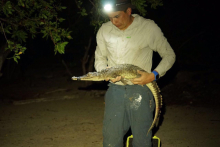
Antibiotics from human use are contaminating rivers worldwide, study shows
Millions of kilometres of rivers around the world are carrying antibiotic pollution at levels high enough to promote drug resistance and harm aquatic life, a McGill University-led study warns.

Ultrasound unlocks a safer, greener way to make hydrogels
Researchers at McGill University, in collaboration with Polytechnique Montréal, pioneered a new way to create hydrogels using ultrasound, eliminating the need for toxic chemical initiators. This breakthrough offers a faster, cleaner and more sustainable approach to hydrogel fabrication, and produces hydrogels that are stronger, more flexible and highly resistant to freezing and dehydration.

Predicting hockey IQ: Researchers’ method of assessing young hockey talent could be a game-changer
In a study that is the first of its kind, a research team led by a McGill professor has developed a more objective way to identify ice hockey players’ game intelligence, or “hockey IQ.” And the method, which pairs objective test results with scouting insights, is likely to yield the most accurate results, the researchers suggest.

Breakthrough discovery uses gut bacteria and AI to diagnose a chronic pain syndrome
McGill University researchers, in collaboration with colleagues in Israel and Ireland, have developed AI technology that can detect patterns in gut bacteria to identify complex regional pain syndrome (CRPS) with remarkable accuracy, potentially transforming how CRPS is diagnosed and treated.

New insights into how cancer spreads prompt rethink of metastasis care
A McGill University-led research collaboration has achieved a breakthrough in understanding how cancer spreads.

Sun safety declining in Canada amid rise in skin cancer cases
Despite decades of public health messaging, Canadians are spending more time in the sun and using less sun protection – raising alarms among researchers as melanoma cases continue to climb.
That trend is highlighted in a McGill University-led study that analyzed national survey data collected between 2011 and 2018 from over 77,000 people, representing a weighted sample of 21 million Canadians.

Researchers improve the accuracy of AI writing tools
A McGill University-led team of researchers has developed a new method that significantly improves the accuracy and efficiency of large language models (LLMs) when generating computer code and other structured text.

McGill researchers develop practical new tool for detecting nanoplastics and microplastics in the environment
A team of McGill University researchers has developed a cost-effective, high-throughput technology for detecting nanoplastics and microplastics in the environment.

Study suggests we don’t just hear music, but ‘become it’
An international study co-authored by McGill psychologist Caroline Palmer suggests our brains and bodies don’t just understand music, they physically resonate with it. These discoveries, based on findings in neuroscience, music, and psychology, support Neural Resonance Theory (NRT).

Researchers identify two new crocodile species
McGill University researchers, in collaboration with Mexican scientists, have discovered two previously unknown species of crocodiles, one living on the island of Cozumel and the other on the atoll of Banco Chinchorro, both off the Yucatán Peninsula. The findings challenge long-held assumptions about the American crocodile (Crocodylus acutus) and highlight the urgent need for conservation efforts, the researchers say.

Our brains can communicate wordlessly, through our eyes
McGill researchers have demonstrated something long assumed: that glances can transmit information about one’s mental state to others without a single word being exchanged. They speculate that this primal ability may have played a role in assuring survival of human society at times when making a sound could have attracted predators.

Drugs targeting ‘zombie cells’ show promise for treating chronic back pain
In a preclinical study led by McGill University researchers, two drugs targeting “zombie cells” have been shown to treat the underlying cause of chronic low back pain. The condition affects millions of people worldwide.
Current treatments manage symptoms through painkillers or surgery, without addressing the root cause.

Fighting honey fraud with AI technology
McGill University researchers have developed an AI-powered method to verify the origin of honey, ensuring that what’s on the label matches what’s in the jar. The breakthrough offers a potential solution to a long-standing problem.

New drone-assisted 3D model offers a more accurate way to date dinosaur fossils
A new study from McGill University is reshaping how scientists date dinosaur fossils in Alberta’s Dinosaur Provincial Park (DPP). Using advanced drone-assisted 3D mapping, researchers have uncovered significant variations in a key geological marker, challenging long-standing methods of determining the ages of dinosaur fossils.

What links cannabis use and psychosis? Researchers point to the brain’s dopamine system
A McGill University-led study found that people with cannabis use disorder (CUD) had elevated dopamine levels in a brain region associated with psychosis.
“This could help explain why cannabis use increases the risk of hallucinations and delusions, key symptoms of schizophrenia and other psychotic disorders,” said first author Jessica Ahrens, a PhD student in McGill’s Integrated Program in Neuroscience.

